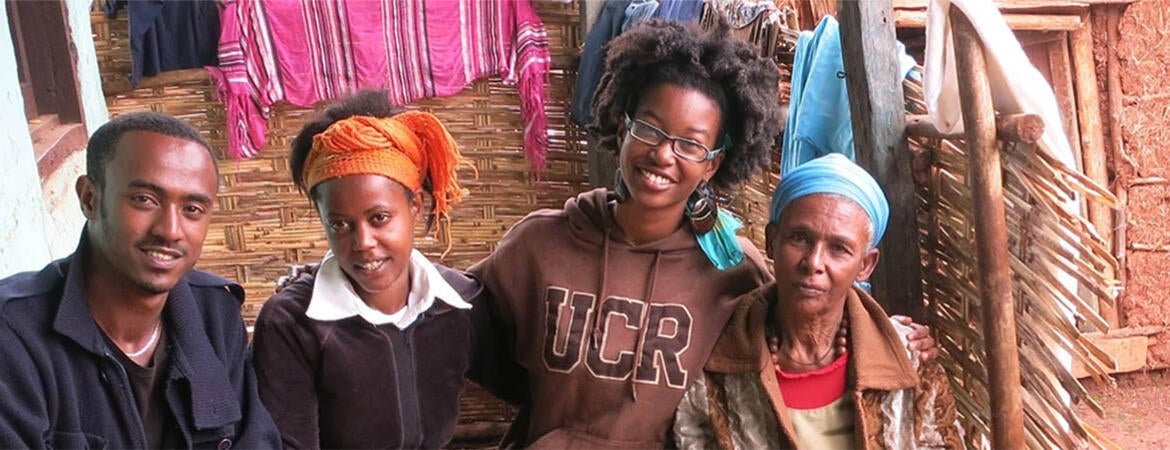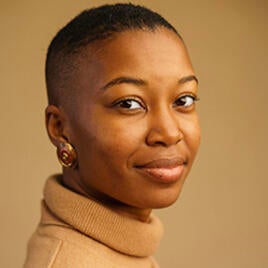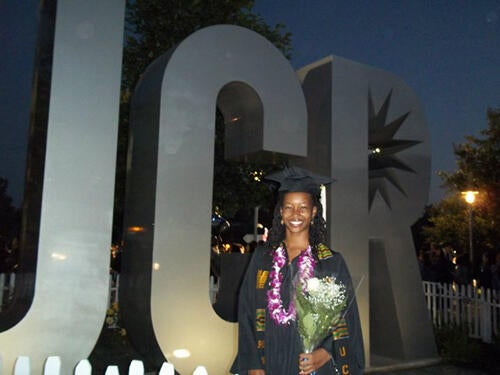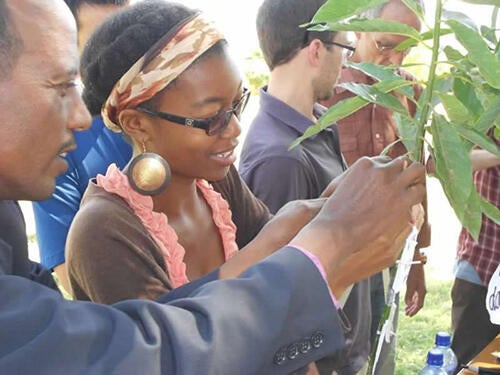
If Breanna Wright ’11 had followed her mom’s plan, she would have become an engineer.
Growing up in the Bay Area, her mother signed her up for summer programs usually focusing on science and math. In her junior year of high school, she enrolled in a Carnegie Mellon University math and science program. She joined the National Society of Black Engineers the same year.
Wright was planning to go to college out of state, but her academic achievements drew the attention of UC Riverside. The university wrote and encouraged her to consider its highly regarded engineering program. With the added attraction of being able to graduate without loans, Wright enrolled as a bioengineering major.
That all changed when she took her first economics class at UCR.
“I loved it. I was like, ‘Oh, this is my language. This is fun. I'm enjoying this,’” Wright said. “And so from there I decided I would switch majors to business. My mom cried as though I was dropping out of college. It's a running joke to this day.”
Her mother eventually came around as Wright leveraged her business degree with a focus on marketing into a career that took her across the globe — including two stints with the Peace Corps — working in international development, agribusiness, and federal policy.
Today she is vice president of talent for The Management Center, a Washington, D.C.-based nonprofit providing best management practices for nonprofits that work in progressive or educational equity spaces.
Motivated to serve others
The common denominator in all those roles was a desire to be of service — something else Wright’s mother instilled in her from a young age.
“She is very much community driven, and I would tag along with her to meetings,” she said. “I was raised in a household that believed you are a part of a community, and it is your job to support and serve the community in ways that you can lend your skills.”
Her skills were sharpened at UCR, where Wright found a new community of her own.
“Riverside is unique,” she said. “Not only is it academically rigorous, but it is a place with a lot of different communities and culture. You'll find your community, without feeling like you're the only one in the classroom.”
Another reason Wright chose to study business: She knew she could apply her education widely, even beyond corporate settings.
“I knew that those skills would always be relevant,” she said. “I have always been able to trace the skills that I've learned from school to different professions, even if it wasn't creating my own business or working in very traditional business fields.”
Connecting to expertise
For example, during her first service with the Peace Corps, in Southern Ethiopia, she taught basic business concepts to rural women business owners, helping them improve inventory tracking and budgeting. Wright also brought in agriculture experts to help female heads of households — most of them HIV-positive — to gain skills in sustainable gardening.
“My project was focused on helping them strengthen their gardening, get connected with seeds from different resources so that they're able to meet their nutritional needs for their family,” she said. “I don't know the seeds. I don't know the farming. But I was able to bring in ag experts from the community as well as from Peace Corps to help with those aspects.”
That turned into a real-world application of the business and leadership principles she gained at UCR.
“I learned I don't have to be the expert in everything, but I can be the vessel,” Wright said.
She continued to lean into agribusiness and international development, supporting programs at Catholic Relief Services in the capitol of Ethiopia, in her return to the Peace Corps in Washington, D.C., and at the U.S. Department of Agriculture. While working full-time in Washington, she earned her master’s degree in development management from American University in 2019. She joined The Management Center in 2021.
Learn your ‘why’
Wright traces that rewarding career path — which included meeting her future husband in the Peace Corps — to her decision to attend UCR. She also credits the courage to change her major to business and encourages all students to give themselves enough latitude to explore their options.
“It's OK to not know what the next step is or not to know why you chose this specific degree,” she said. “It's not the end of the world if you switch majors. If you don't know exactly what you want to do after you finish school, it’s OK. All you need to do learn your ‘why’ and you'll be surprised how it follows you.”
These are uncertain times for the nonprofit sector Wright now serves — as well as for the federal workforce in her new hometown and wider economy — amid program closures, budget cuts and layoffs. As a former federal employee, she’s aware of the challenge laid-off workers face in marketing their skills to new roles.
She’s also concerned about the impact on universities that receive federal funding, and for the future of initiatives like the African Student Program she embraced at UCR. Nonetheless, Wright works to maintain a positive outlook, based on her own experience, that the next generation of students and graduates will find their place in the world.
“I graduated right around the Great Recession, and friends were either staying in school or moving back home,” she said. “The point being, if you're graduating during a tough time, things will be OK. They'll work out.”
While Wright is no longer working directly in agribusiness, the seeds that were planted in Ethiopia took root. She is an avid urban gardener and has even started beekeeping in her backyard in Washington. She also has started teaching agriculture and nutrition in an after-school youth program.
“I'm looking at the business side of it and considering becoming a garden consultant,” she said.
“People have been asking me how to start their garden. I'm thinking about selling the honey from my bees. I'm in a course right now to get further certified, but the business skills that I learned from UCR are still there.
“Business follows you no matter what you're doing,” she said.
As for another constant in her life, Wright’s mother could not be prouder of the daughter who chose not to become an engineer.
“She finally got over it and now she calls me for gardening tips all the time,” Wright said. “My family was very excited that I went into Peace Corps. It changed my family. Everyone travels now. They met me in Thailand when I graduated from undergrad. They visited me in Ethiopia.
“It just opened the world for everyone in my family to see what we can do and where we can go and the experiences we can create.”


